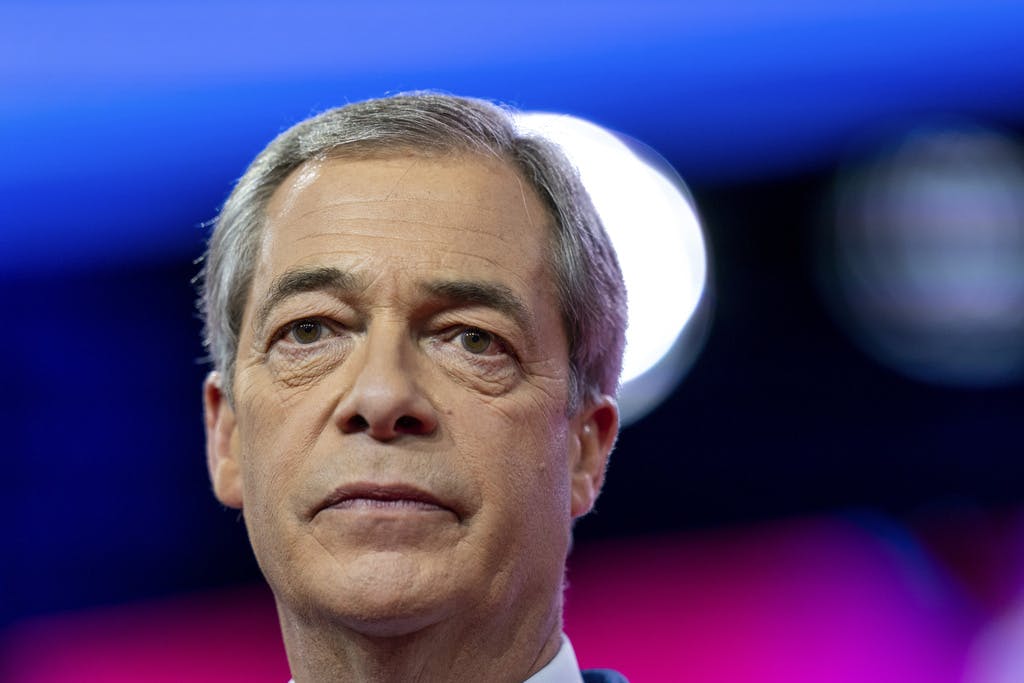Nigel Farage’s Bumpy Road to ‘Debanking’ Was Paved by President Biden’s Good Intentions
The president’s opposition to all things Russian risks backfiring in unforeseen ways.

Who said banking was boring? The saga of Brexit campaigner Nigel Farage’s run-in with one of Britain’s most prestigious banks over his political views is lifting the lid on a new form of financial ostracism.
In an extraordinary article in London’s Evening Standard, the owner of that newspaper, Evgeny Lebedev, claims that included among the reasons listed in a 40-page dossier that the Coutts bank generated to justify depriving Mr. Farage of his accounts is the conservative broadcaster’s alleged ties with Russia.
The precise degree to which “Russophobia,” as Mr. Lebedev phrases it, played a role in Mr. Farage’s initial predicament with his bank and the controversy that has ensued is not clear. The bank dossier that got this rollercoaster ride going, though, leaves no doubt that it was a factor.
Last year, a Labor member of parliament, Christopher Bryant, told the House of Commons: “I’d simply point out that Nigel Farage received from Russia Today 548,573 pounds in 2018 alone from the Russian state.” Mr. Farage, who formerly led the UK Independence Party and is currently a presenter for GB News, subsequently stated that he “did not receive a penny from Russia Today,” though he did say that “in previous years, I’d done a couple of bits for them.”
So what? First, regardless of whether Russia did pay Mr. Farage anything to appear on the RT network, that would have happened well before Russia’s invasion of Ukraine. Second, the evocation of Russian links alone raises the specter of guilt by association — one of the hallmarks of woke culture run amok on both sides of the Atlantic.
That in turn implicates, at least on an abstract level, President Biden, who has made turning Russia into a pariah state a by-product of his uneven strategy for bringing a belligerent Russia to heel in Ukraine. His chief architect in that effort is Secretary Blinken, who early on in the Russian invasion promulgated the optimistic view that economic sanctions would cripple the Kremlin.
That they have not is a fact not lost on Mr. Lebedev, a British-Russian press baron and something of an international playboy whom his friend, Prime Minister Johnson, nominated for a life peerage in the House of Lords in 2020. Mr. Lebedev’s father, Alexander, is a former KGB officer and today an archetypal Russian oligarch. He owns the Independent newspaper along with his son.
The fallout from the present scandal is widespread. As the Sun reported, the CEO of NatWest, the company that owns Coutts, has resigned as the British government starts examining in earnest banks that could have shut down multiple accounts out of political motivations.
The departure of NatWest’s Alison Rose — speaking to the BBC about Mr. Farage’s account, she said she’d made a “serious error of judgment” — was swift, as Coutts bankers had “debanked” Mr. Farage just this month.
Mr. Farage’s personal and political fortunes are likely of little concern, though, to Evegeny Lebedev, who claims that “moral misalignment” has put a dent not only in his social standing but possibly his bank balances, too.
“Since the outbreak of the war in Ukraine,” he wrote, “I’ve been turned down by all manner of businesses and institutions, who applaud their anti-Russian sentiment as a symbol of moral rectitude after spending decades prostrating for the attention of Russian money.”
Mr. Lebedev stated that while he “called for the war to end in the first week of the invasion, on the front page of the free London paper I rescued from financial ruin,” he in effect now needs “a new surname, a new passport, and a new speech therapist to train the Ruski accent out of me.”
While Mr. Lebedev’s resentment may earn little sympathy, it does at a minimum reflect how an overly simplistic foreign policy thrust can trickle down with both financial and social consequences that can be hard to control.
In the meantime, a former American official has confirmed to the Moscow Times that secret “track 1.5” talks between “senior U.S. national security officials and high-ranking members of the Kremlin” are ongoing. The official told the newspaper that “an attempt to isolate and cripple Russia to the point of humiliation or collapse would make negotiating almost impossible.”
What is happening in the worlds of athletics and travel — and now banking, too — mirrors the anti-Russian climate fostered by the White House and shows the limits of scapegoating as a form of political expedience.
At the World Fencing Championships at Milan on Thursday, a Ukrainian fencer, Olga Kharlan, won a match but refused to shake hands with her opponent, a Russian fencer, Anna Smirnova. Ms. Smirnova was competing under a neutral flag, but no matter: When Ms. Smirnova offered Ms. Kharlan her hand, she received the tip of the victor’s saber instead. Ms. Kharlan was disqualified.
Following that incident Ukraine has signaled it will no longer bar its athletes from competing against Russians who are taking part in sporting events as neutral athletes.

